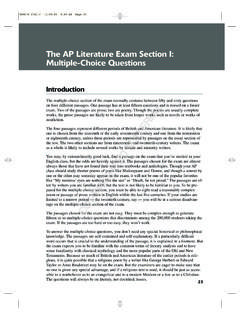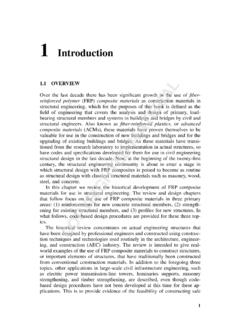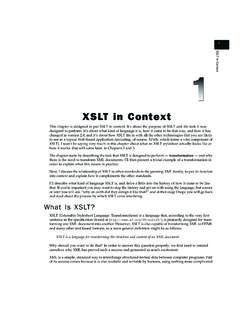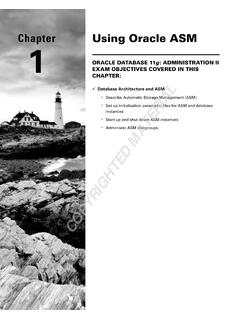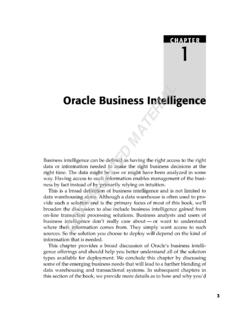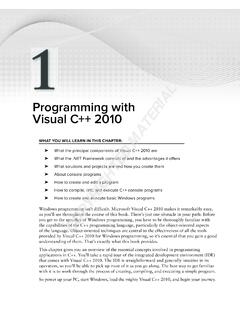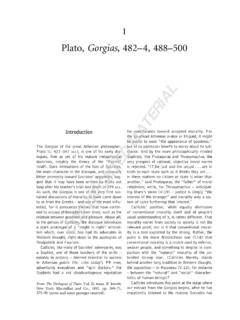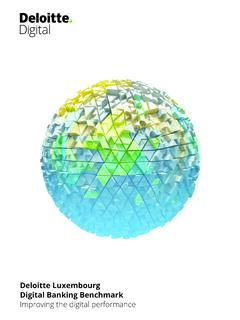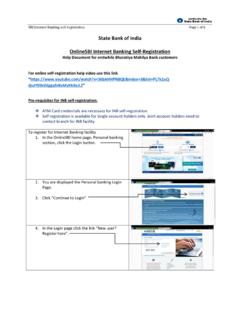Transcription of Banking 101: Understanding the Basics COPYRIGHTED …
1 CHAPTER 1 Banking 101: Understanding theBasicsAfter reading this chapter, you will be able to: Understand the origin of Banking and how it has evolved. Explain the role of banks in the creation of money. Discuss the essential elements of electronic Banking andfunds transfers. Recognize the role of banks in financial intermediation. Describe the range of products and services offered bybanks. Understand how financial products and services satisfy theneeds of MATERIALWhat Is a bank ?Abankis defined by Merriam-Webster s online dictionary ( ) as an establishment for the custody, loan, ex-change, or issue of money, for the extension of credit, and for facilitatingthe transmission of funds.
2 While they are simple to describe, the roles of banks, bankers, andbanking are for some not as simple to understand. Banking can be defined as the business of Banking , a vibrantbusiness that continually evolves to meet the latest financial needs andeconomic conditions. In order to understand how Banking evolves, it isimportant to gain a broad Understanding of financial concepts, funda-mental Banking functions, and the Banking business in a technology-driven Barter to Payment SystemsMoney is the basis of Banking . And the basis of money is the need for asubstitute for directly bartering for everything we need. Barter is de-fined as trading without the use of money and it can be traced back tothe very origin of civilization.
3 Can you imagine how our economy wouldoperate if we didn t use money? You would either have to be completelyself-sufficient or have to produce a good or service that you could trade forwhatever you could not produce yourself. Most of us would spend ourtime making almost everything we needed (including growing food,building shelter, and making clothes) or working at a specialty that othersneeded so we could trade for many of the necessities of life. The specialtieswould be few. Our technological advances would be restricted by an in-credibly inefficient system of exchanging goods and development of money was a significant advance over barter as apayment system.
4 But today we have extended the concept of paymentsystems way beyond the original concept of money. One of the first stepsinto more sophisticated payment systems was the development of checksand checking 101: Understanding the Basics2 Money is a symbol of value, and checks are a symbol of money. Wegive another person a check when we want to give him or her other person then takes that check and sends it through the checkclearing system so that the money it represents is transferred from us tohim or it or not, prior to the age of computers, Banking employeesposted transactions on individualaccount cards. Banks had to close forbusiness early in the afternoon so that several hours could be devoted torecording and reconciling the day s early computer systems used in Banking seemed like a tremen-dous advance over manual systems.
5 But today they seem like pocket cal-culators compared to the computing power that the Banking industryand customers depend on and, frankly, take for have changed the face and complexion of the bankingbusiness. Computers have changed how customers use Banking services,how banks operate internally, and how banks interact with the rest of thefinancial has revolutionized Banking and continues to do so at afiercely accelerating speed. Computers, the Internet, mobile technology,wireless access, and other improved communication systems give bank -ing great flexibility and efficiency. All of this growth continues to createnew opportunities to reinvent banks and, in particular, Banking also fulfills a valuable role in society by: Playing a key role in financial intermediation Creating financial products and services that benefit businesses andconsumers Driving a thriving financial system regulated by state and federalgovernments Facilitating the creation of money Being involved in the transfer of funds Reinventing the financial future the future of bankingWhat Is a bank ?
6 What Is a bank ?What Is a bank ?3In order to understand the business of Banking , it is useful to under-stand one of its key elements financial s Role in Financial IntermediationFinancial intermediation is an important role in Banking . The term fi-nancial intermediation means accepting funds from one source (such assavings customers) and using the money to make loans or other invest-ments. Essentially, financial intermediation means acting as a go-betweenfor individuals or businesses that have extra money and individuals orbusinesses that want to borrow person or business with extra funds could try to find a borroweron its own, but the process would be time-consuming and difficult.
7 Canyou imagine how difficult it would be to find another person who wouldwant to borrow the exact amount of your savings for the length of timeyou want to lend it?Financial intermediation is a business activity that supplies a serviceby pooling funds from many different sources and advancing loans andmaking investments. The people and businesses that supply the funds re-ceive interest or services for allowing their funds to be pooled and loanedout or invested. The borrowers pay interest for the privilege of borrow-ing money they use to generate income or meet other way to understand financial intermediation is to compare itto another type of intermediation.
8 Consider how a blood bank blood bank finds healthy individuals and arranges for them to donateblood. The blood bank then processes the blood and makes it available tohospitals. The blood bank does not actually use the blood; it simply actsas a channel (or intermediary) between the donors and the as the blood bank functions between the donor and recipient ofblood, a bank acts as an intermediary between those with extra moneyand those who want to borrow money. It is a financial intermediary. Thisis one of the unique characteristics of financial institutions, and of banksin particular their role as financial 101: Understanding the Basics4 Banking and the Creation of MoneyBanking plays the most critical role in the creation of money no, notby cranking up the presses and printing money.
9 Banks do not print cur-rency. What we mean by the creation of money is this: The financialsystem creates money by expanding the supply of money through de-posit and loan transactions. Exhibit is an example of how it MoneyMr. BorrowerMaple StateBankElm BankOak NationalBankHome Furnishings, Reserve20% ReserveMs. Customer$800 can be loaned out$1,000 deposit$640deposit$640 for furniture$800 deposit$800 forplumbingsuppliesInitial $1,000 hasgenerated $1,400 new money in the system$640 can be loaned outMr. PlumberLocal Plumbing SupplyAssume that Carol Customer puts $1,000 in a checking account at Maple StateBank. The bank must set aside part of this money as reserves and can then loan outthe Federal Reserve System establishes reserve requirements.
10 Reserve re-quirements are usually fairly low, but, for this example, assume they are 20 percentof the deposit. This would mean that $800 of the deposit could be loaned Plumber, a Maple bank customer, needs to borrow money and draws on aline of credit in the amount of $800. He writes out a check for the $800 and gives it toLocal Plumbing Supply to purchase materials for a bathroom-remodeling project hehas been hired to complete.(continued)What Is a bank ?What Is a bank ?What Is a bank ?5In addition to the creation of money, Banking plays an important partin the economy by providing for payment mechanisms or methods totransfer funds. Cash is the historical basis for trading goods and servicesin our country, but today most consumers or businesses use other meth-ods to transfer funds from one person or business to traditional system historically is the use of checks and checkingaccounts.
